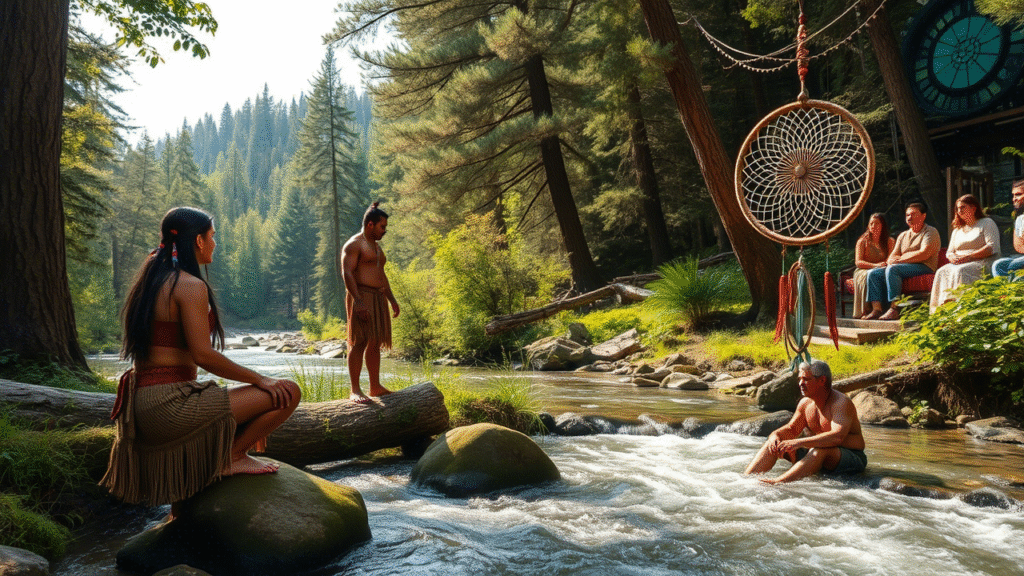In a world dominated by fast-paced lifestyles, consumerism, and climate concerns, many are turning to indigenous philosophies about nature and balance to reconnect with the Earth and live more harmoniously. These ancient belief systems, rooted in centuries of lived experience, offer profound lessons in sustainability, respect, and interconnection — values that modern societies urgently need to revisit.
In this article, we’ll explore the key themes and teachings from various indigenous cultures that reflect a deep reverence for nature and balance, and how we can incorporate these principles into our modern lives.
🌿 What Are Indigenous Philosophies About Nature?
Indigenous philosophies are systems of knowledge passed down through generations, often through oral traditions, rituals, and communal living. These belief systems see nature not as a resource to be exploited, but as a living entity — interconnected, sacred, and worthy of respect.
Across continents, these teachings emphasize:
- Harmony with the land
- Spiritual connection with animals, plants, and natural elements
- Responsibility to preserve the Earth for future generations
- Balance between material needs and spiritual wellbeing
These are not just cultural values; they are frameworks for sustainable living.
🌍 Core Principles from Indigenous Traditions
Let’s look at how different indigenous communities view nature and balance:
1. Native American Wisdom: The Web of Life
In many Native American traditions, everything is interconnected in what is known as the “Web of Life.” Each element — trees, animals, rivers, humans — has a spirit and plays a vital role in the balance of the universe.
- The Lakota speak of Mitákuye Oyás’iŋ, meaning “all my relations,” acknowledging kinship with all beings.
- The Cherokee honor the Four Directions (north, south, east, west), each representing balance in natural and spiritual realms.
Key Lesson: Respecting nature as kin prevents exploitation and fosters gratitude.
2. Australian Aboriginal Dreamtime: Living in Story
Aboriginal Australians believe in “Dreamtime”, a spiritual concept that links the past, present, and future through land and ancestral beings.
- The land is not “owned” — it is a living memory of creation stories.
- People are custodians, not controllers of nature.
Key Lesson: We must listen to the land’s stories and care for it like family.
3. Andean Cosmovision: Ayni and Pachamama
The Quechua and Aymara peoples of the Andes embrace the concept of Ayni, which means reciprocity. This governs relationships with people, animals, and the Earth.
- Pachamama, or Mother Earth, is honored in rituals and daily life.
- Planting, harvesting, and ceremonies follow a natural rhythm, honoring balance.
Key Lesson: Give back to the Earth as much as you take — in actions, gratitude, and spirit.
4. African Ubuntu Philosophy: I Am Because We Are
While Ubuntu is often applied to human relationships, its principles extend to the natural world.
- In many African communities, nature is part of the collective “we.”
- Trees, rivers, and animals are part of the community and should be treated with respect.
Key Lesson: Interconnectedness applies to all life — harming nature is harming yourself.
5. Maori Worldview: Kaitiakitanga and Whakapapa
The Maori of New Zealand believe in Kaitiakitanga, the guardianship of nature. It is not a right, but a sacred duty.
- Whakapapa refers to genealogical connections, not only among people but between humans and the natural world.
- Mountains, rivers, and forests are ancestors.
Key Lesson: We are descendants of the Earth and must honor our lineage by protecting it.
🌱 Modern Applications of Indigenous Teachings
While these philosophies are ancient, they are deeply relevant today. Here’s how we can draw inspiration:
✅ 1. Sustainable Living
- Practice minimalism — only take what you need.
- Support regenerative agriculture and community-based farming.
- Reduce waste and honor natural resources.
✅ 2. Environmental Activism
- Learn from indigenous-led conservation movements (e.g., Amazon forest protection).
- Support land rights for indigenous peoples, who often act as stewards of biodiversity.
✅ 3. Spiritual Practice
- Create daily rituals to connect with nature — walk barefoot, meditate outdoors, or journal during sunrise.
- Treat nature as a teacher — observe its cycles and apply its wisdom to your life.
✅ 4. Community Engagement
- Join or create spaces where cultural storytelling and intergenerational learning are respected.
- Partner with indigenous organizations and listen rather than lead.
🔍 Why This Matters Today
Climate change, deforestation, water scarcity, and species extinction are symptoms of a disconnect from nature. Indigenous philosophies provide not just commentary but pathways back to balance.
These teachings remind us:
- The Earth is not a machine — it is a living being.
- Balance is not a luxury — it is a necessity for survival.
- Wisdom doesn’t always come from new science — sometimes, it comes from ancient voices we’ve forgotten to hear.
🧘♀️ Conclusion: Listening to the Earth Again
“Indigenous philosophies about nature and balance” are not just cultural curiosities; they are essential guides for humanity’s collective future. From reciprocity and guardianship to interconnectedness and storytelling, these traditions offer deep insight into how we might restore harmony — with ourselves, with each other, and with the Earth.
As we strive for progress, let us not forget the wisdom that progressed quietly for centuries, rooted in the soil beneath our feet and the stories whispered by the wind.


